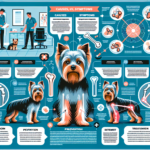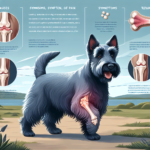Yorkshire Terrier Joint Pain: Causes, Symptoms, Prevention, and Treatment

Introduction
The Yorkshire Terrier, affectionately known as the Yorkie, is a small but spirited breed that has captured the hearts of dog lovers worldwide. Originating from England in the 19th century, Yorkies were initially bred for hunting small vermin in textile mills. Over time, they transitioned from working dogs to beloved companions, known for their luxurious, silky coats and feisty personalities. Despite their small size, Yorkies are known for their boldness and high energy levels.
Like all breeds, Yorkshire Terriers are prone to certain health issues. Common concerns include dental problems, hypoglycemia, and tracheal collapse. However, one of the most significant health issues that can affect Yorkies is joint pain. Given their active nature and small frame, maintaining joint health is crucial for their overall well-being and quality of life.
Breed-Specific Joint Pain Risks
Genetic Predisposition
Yorkshire Terriers, like many purebred dogs, have a genetic predisposition to certain joint-related issues. Hip dysplasia, although more common in larger breeds, can still affect Yorkies. This condition occurs when the hip joint doesn’t fit properly into the hip socket, leading to pain and arthritis over time. Additionally, Yorkies are susceptible to patellar luxation, a condition where the kneecap dislocates from its normal position, causing intermittent lameness and discomfort.
Age-Related Risks
As Yorkshire Terriers age, the risk of developing joint pain increases. Arthritis is a common age-related condition that affects many older dogs, including Yorkies. This degenerative joint disease leads to the breakdown of cartilage, causing pain, inflammation, and reduced mobility. Owners should be vigilant about monitoring their Yorkies for signs of joint pain as they reach their senior years, typically around 7-10 years of age.
Activity Level and Joint Stress
Yorkies are known for their high energy levels and playful nature. While regular exercise is essential for their overall health, excessive or inappropriate activity can put undue stress on their joints. Activities that involve jumping or sudden changes in direction can be particularly hard on their joints, increasing the risk of injury and long-term joint issues.
Common Symptoms of Joint Pain in Yorkshire Terriers
General Symptoms
Owners should be aware of several common symptoms that may indicate joint pain in their Yorkshire Terrier:
- Limping: A noticeable limp or favoring one leg over another can be a sign of joint pain.
- Stiffness: Difficulty getting up from a lying position or stiffness after resting can indicate joint issues.
- Reluctance to Move: A Yorkie that is hesitant to jump, climb stairs, or go for walks may be experiencing joint pain.
- Behavioral Changes: Increased irritability or withdrawal from social interactions can be a response to chronic pain.
Breed-Specific Symptoms
In Yorkshire Terriers, specific symptoms may be more pronounced due to their size and build. For instance, patellar luxation may cause a Yorkie to skip or hop on three legs intermittently. Additionally, due to their small size, even minor changes in gait or activity levels can be more noticeable compared to larger breeds.
When to Consult a Vet
If you observe any of the above symptoms in your Yorkshire Terrier, it is essential to consult a veterinarian promptly. Early diagnosis and intervention can significantly improve the prognosis and quality of life for dogs with joint pain. Regular veterinary check-ups are also crucial for monitoring joint health and catching any issues early.
Preventive Measures for Joint Health
Exercise Recommendations
Maintaining an appropriate exercise routine is vital for preventing joint issues in Yorkshire Terriers. Low-impact activities such as walking and swimming are excellent choices for keeping their joints healthy without causing excessive stress. Avoid activities that involve a lot of jumping or sudden changes in direction, as these can increase the risk of joint injuries.
Dietary Suggestions
A balanced diet rich in essential nutrients can support joint health in Yorkies. Consider incorporating foods or supplements that contain glucosamine, chondroitin, and omega-3 fatty acids, which are known to promote joint health and reduce inflammation. Always consult your veterinarian before adding any supplements to your dog’s diet.
Weight Management
Maintaining a healthy weight is crucial for reducing joint stress in Yorkshire Terriers. Excess weight can exacerbate joint pain and lead to more severe joint issues over time. Monitor your Yorkie’s weight regularly and adjust their diet and exercise routine as needed to keep them at an optimal weight.
Early Screening and Monitoring
Regular veterinary check-ups and early screening for joint issues can help catch problems before they become severe. Your veterinarian may recommend specific tests or imaging studies to assess your Yorkie’s joint health, especially if they are genetically predisposed to certain conditions.
Treatment Options for Joint Pain
Non-Surgical Treatments
Several non-surgical treatment options can help manage joint pain in Yorkshire Terriers:
- Medications: Anti-inflammatory drugs and pain relievers can help reduce pain and inflammation associated with joint issues.
- Physical Therapy: Targeted exercises and therapies can improve joint mobility and strength.
- Lifestyle Adjustments: Modifying your Yorkie’s activity level and providing a comfortable living environment can help manage joint pain.
Surgical Options
In severe cases, surgical intervention may be necessary to alleviate joint pain and improve mobility. Common surgical options for Yorkies include:
- Patellar Luxation Surgery: Corrective surgery to stabilize the kneecap and prevent dislocation.
- Hip Dysplasia Surgery: Procedures such as femoral head ostectomy (FHO) or total hip replacement (THR) can address severe hip dysplasia.
Alternative Therapies
Alternative treatments can also be beneficial for managing joint pain in Yorkshire Terriers:
- Acupuncture: This traditional Chinese medicine technique can help reduce pain and inflammation.
- Hydrotherapy: Water-based exercises can improve joint mobility and strength without putting stress on the joints.
- Massage: Regular massage can help alleviate muscle tension and improve circulation around the joints.
Lifestyle and Management Tips
Daily Care Routine
A consistent daily care routine can help manage and alleviate joint pain in Yorkshire Terriers. This routine might include gentle exercises, regular grooming to prevent matting and discomfort, and administering any prescribed medications or supplements.
Modifying the Home Environment
Making your home more comfortable for a Yorkie with joint pain can significantly improve their quality of life. Consider adding ramps to help them navigate stairs, providing orthopedic beds for better support, and ensuring that their living area is free of obstacles that could cause injury.
Long-Term Management
Long-term management of joint pain involves regular veterinary check-ups, ongoing monitoring of your Yorkie’s condition, and making necessary adjustments to their care routine. Keeping your Yorkie active and engaged with appropriate activities can help maintain their mobility and overall well-being.
FAQs About Yorkshire Terriers and Joint Pain
What are the early signs of joint pain in Yorkshire Terriers?
Early signs of joint pain in Yorkies include limping, stiffness, reluctance to move, and behavioral changes such as increased irritability or withdrawal.
Can joint pain in Yorkshire Terriers be prevented?
While it may not be possible to prevent all cases of joint pain, maintaining a healthy weight, providing appropriate exercise, and regular veterinary check-ups can significantly reduce the risk and severity of joint issues.
Are there specific diets that can help with joint health in Yorkies?
Yes, diets rich in glucosamine, chondroitin, and omega-3 fatty acids can support joint health. Always consult your veterinarian before making any dietary changes or adding supplements.
When should I consider surgery for my Yorkie’s joint pain?
Surgery should be considered when non-surgical treatments are no longer effective, and your Yorkie’s quality of life is significantly impacted by joint pain. Consult your veterinarian to discuss the best options for your pet.
Conclusion
Joint pain is a significant concern for Yorkshire Terriers, but with proper care and attention, it can be managed effectively. By understanding the causes, symptoms, and preventive measures, owners can take proactive steps to ensure their Yorkie’s joint health. Regular veterinary check-ups, a balanced diet, appropriate exercise, and a comfortable living environment are all crucial components of maintaining joint health in this beloved breed. Remember, early intervention and consistent care can make a world of difference in your Yorkie’s quality of life.

